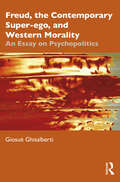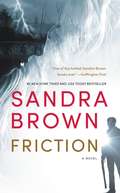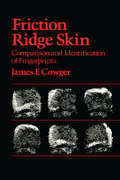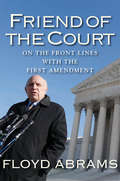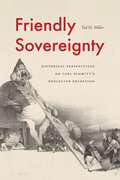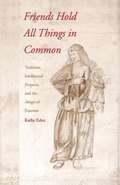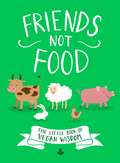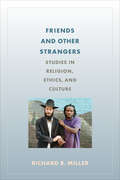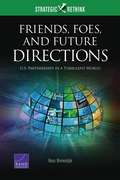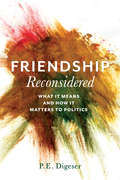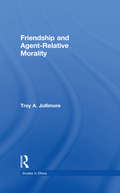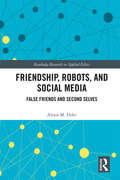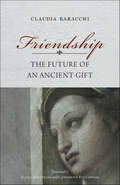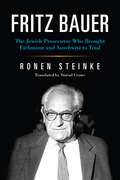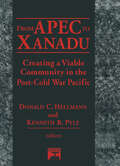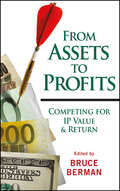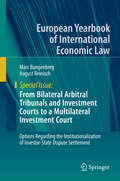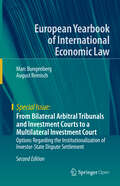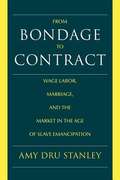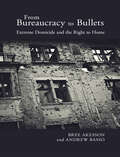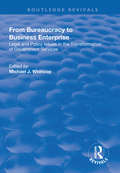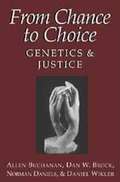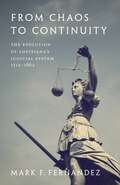- Table View
- List View
Freud, the Contemporary Super-ego, and Western Morality: An Essay on Psychopolitics
by Giosuè GhisalbertiFreud, the Contemporary Super-ego, and Western Morality traces the origins of the relationship between the morality of the super-ego and the destructive impulse of the death drive in the liberal democracies of the 21st century. Giosuè Ghisalberti begins by refuting the analysis by contemporary social theorists of the phenomenon described as "the return of the religious," presenting instead a comprehensive set of ideas as outlined by Freud in the writings of the 1920s and the analysis of a contemporary theological-political unconscious. Ghisalberti argues that the psyche of the liberal West has regressed to an infantile and primitive present, driven by an unconscious hostility towards the Oedipus complex and, more comprehensively, to Western civilization as a whole. The book re-examines Freud’s psychoanalytic ideas on the nature of obsessions, interpreted first from the murder of the primal father in Totem and Taboo, and turns to his grounding ideals of intelligence, creativity, and freedom as the affirmation of the coming-to-be-human in modernity. Freud, the Contemporary Super-ego, and Western Morality will be of great interest to psychoanalysts in practice and in training. It will also be key reading for academics and scholars of psychoanalytic studies, philosophy, political theory and the humanities.
Friction
by Sandra BrownFrom #1 New York Times bestselling author Sandra Brown comes a gripping story of family ties and forbidden attraction.Crawford Hunt wants his daughter back. Following the death of his wife four years ago, Crawford, a Texas Ranger, fell into a downward spiral that left him relegated to deskwork and with his five-year-old daughter Georgia in the custody of her grandparents. But Crawford has cleaned up his act, met all the court imposed requirements, and now the fate of his family lies with Judge Holly Spencer.Holly, ambitious and confident, temporarily occupies the bench of her recently deceased mentor. With an election upcoming, she must prove herself worthy of making her judgeship permanent. Every decision is high-stakes. Despite Crawford's obvious love for his child and his commitment to being an ideal parent, Holly is wary of his checkered past. Her opinion of him is radically changed when a masked gunman barges into the courtroom during the custody hearing. Crawford reacts instinctually, saving Holly from a bullet. But his heroism soon takes on the taint of recklessness. The cloud over him grows even darker after he uncovers a horrifying truth about the courtroom gunman and realizes that the unknown person behind the shooting remains at large . . .and a threat. Catching the real culprit becomes a personal fight for Crawford. But pursuing the killer in his customary diehard fashion will jeopardize his chances of gaining custody of his daughter, and further compromise Judge Holly Spencer, who needs protection not only from an assassin, but from Crawford himself and the forbidden attraction between them. FRICTION will keep you on the edge of your seat with breathtaking plot twists and the unforgettable characters that make Sandra Brown one of the world's best-loved authors. It is an extraordinary novel about the powerful ties that bind us to the ones we love and the secrets we keep to protect them.
Friction Ridge Skin: Comparison and Identification of Fingerprints (Practical Aspects Of Criminal And Forensic Investigation Ser. #Vol. 2)
by James F. CowgerHere is a complete guide to the collection, classification, and comparison of friction skin prints and the determination of identity and nonidentity. It discusses: the cause and significance of variations in prints; the importance of class characteristics in print; the application of probability in decision making; and photographic techniques and considerations.
Friend of the Court
by Floyd AbramsSince 1971, when the Pentagon Papers were leaked to the New York Times and furious debate over First Amendment rights ensued, free-speech cases have emerged in rapid succession. Floyd Abrams has been on the front lines of nearly every one of these major cases, which is also to say that, more than any other person, he has forged this country's legal understanding of free speech. Litigating everything from national-security and prior-restraint issues to controversies concerning the law of libel and attempts by local officials to censor art, Abrams has worked devotedly to protect the First Amendment, the "crown jewel" of America's Constitution. This collection of Abrams's writings gathers speeches, articles, debates, briefs, oral arguments, and testimony from his entire career. The writings illuminate topics of ongoing import: WikiLeaks, the correctness of the Citizens United case, journalist shield laws, and, not least, the responsibilities of the press. An exceptional writer and a brilliant thinker, Abrams offers a unique perspective on the First Amendment and the unparalleled rights it confers.
Friendly Sovereignty: Historical Perspectives on Carl Schmitt's Neglected Exception
by Ted H. MillerOver the last one hundred years, the term “sovereignty” has often been associated with the capacity of leaders to declare emergencies and to unleash harmful, extralegal force against those deemed enemies. Friendly Sovereignty explores the blind spots of this influential perspective.Ted H. Miller challenges the view of sovereignty propounded by Carl Schmitt, the Weimar and Nazi–period jurist and political theorist whose theory undergirds this understanding of sovereignty. Claiming a return to concepts of sovereignty forgotten by his liberal contemporaries, Schmitt was preoccupied with the legal exceptions required, he said, to rescue polities in crisis. Much is missing from what Schmitt harvests from the past. His framework systematically overlooks another extralegal power, one that often caused consternation, even among absolutists like Thomas Hobbes. Sovereigns also made exceptions for friends, allies, and dependents. Friendly Sovereignty plumbs the history of political thought about sovereignty to illustrate this other side of the sovereign’s exception-making power. At the core of this extensive study are three thinkers, each of whom stakes out a distinct position on the merits and demerits of a “friendly sovereign”: the nineteenth-century historian Jules Michelet, the seventeenth-century political philosopher Thomas Hobbes, and Seneca, the ancient Stoic and teacher of Nero.Analytically rigorous and thorough in its intellectual history, Friendly Sovereignty presents a more comprehensive understanding of sovereignty than the one typically taught today. It will be particularly useful to scholars and students of political theory and philosophy.
Friends Hold All Things in Common: Tradition, Intellectual Property, and the Adages of Erasmus
by Kathy EdenResponding in 1523 to a request from his friend John Botzheim, then Canon of Constance, to provide a catalogue of his works, Erasmus recalls among many other things the unfortunate events that occasioned his making a collection of Greek and Roman proverbs--the project that secured his literary fame throughout Europe and that has come down to us as the Adages.
Friends Not Food: The Little Book of Vegan Wisdom
by AnonymousChickens, Cows, Ducks, Sheep, Pigs, Rabbits, Trout, Salmon, Prawns, Lobsters - all of the animal kingdom - are not here for us to eat, we should be looking after them.Friends Not Food is a celebration of our relationship with our animal friends and is packed with vegan sayings as well as facts about both those animals and the industries that prey on them.The perfect gift for anyone who loves animals!And whilst you #StayHome, don't miss these other great titles from Sphere Books: ** Distract Yourself: 101 Positive Things to Do and Learn Whilst You Stay Home ** ** The Bumper Book of Would You Rather? Over 350 hilarious hypothetical questions for ages 6 to 106 **** Home Sweet Home: The Little Book of Natural Cleaning **** Shelf Respect: A Book Lovers' Guide to Curating Book Shelves at Home **
Friends Not Food: The Little Book of Vegan Wisdom
by AnonymousChickens, Cows, Ducks, Sheep, Pigs, Rabbits, Trout, Salmon, Prawns, Lobsters - all of the animal kingdom - are not here for us to eat, we should be looking after them.Friends Not Food is a celebration of our relationship with our animal friends and is packed with vegan sayings as well as facts about both those animals and the industries that prey on them.The perfect gift for anyone who loves animals!And whilst you #StayHome, don't miss these other great titles from Sphere Books: ** Distract Yourself: 101 Positive Things to Do and Learn Whilst You Stay Home **** The Bumper Book of Would You Rather? Over 350 hilarious hypothetical questions for ages 6 to 106 **** Home Sweet Home: The Little Book of Natural Cleaning **** Shelf Respect: A Book Lovers' Guide to Curating Book Shelves at Home **
Friends and Other Strangers: Studies in Religion, Ethics, and Culture
by Richard B. MillerRichard B. Miller aims to stimulate new work in religious ethics through discussions of ethnography, ethnocentrism, relativism, and moral criticism; the ethics of empathy; the meaning of moral responsibility in relation to children and friends; civic virtue, loyalty, war, and alterity; the normative and psychological dimensions of memory; and religion and democratic life.
Friends and Other Strangers: Studies in Religion, Ethics, and Culture
by Richard MillerFriends and Other Strangers argues for expanding the field of religious ethics to address the normative dimensions of culture, interpersonal desires, friendships and family, and institutional and political relationships. Richard B. Miller urges religious ethicists to turn to cultural studies to broaden the range of the issues they address and to examine matters of cultural practice and cultural difference in critical and self-reflexive ways. Friends and Other Strangers critically discusses the ethics of ethnography; ethnocentrism, relativism, and moral criticism; empathy and the ethics of self-other attunement; indignation, empathy, and solidarity; the meaning of moral responsibility in relation to children and friends; civic virtue, war, and alterity; the normative and psychological dimensions of memory; and religion and democratic public life. Miller challenges distinctions between psyche and culture, self and other, and uses the concepts of intimacy and alterity as dialectical touchstones for examining the normative dimensions of self-other relationships. A wholly contemporary, global, and interdisciplinary work, Friends and Other Strangers illuminates aspects of moral life ethicists have otherwise overlooked.
Friends, Foes, and Future Directions
by Hans BinnendijkReport evaluates strategies for dealing with U.S. partners and adversaries in Europe, Asia, and the Middle East in a time of diminishing defense budgets and American public preference for a domestic focus. The three proposed strategies are to be more assertive, to be more collaborative, or to retrench from international commitments. Each strategy is constrained and a balance will need to be struck among them that varies from region to region.
Friendship Reconsidered: What It Means and How It Matters to Politics
by P. DigeserIn the history of Western thought, friendship's relationship to politics is checkered. Friendship was seen as key to understanding political life in the ancient world, but it was then ignored for centuries. Today, friendship has again become a desirable framework for political interaction. In Friendship Reconsidered, P. E. Digeser contends that our rich and varied practices of friendship multiply and moderate connections to politics. Along the way, she sets forth a series of ideals that appreciates friendship's many forms and its dynamic relationship to individuality, citizenship, political and legal institutions, and international relations. Digeser argues that, as a set of practices bearing a family resemblance to one another, friendship calls our attention to the importance of norms of friendly action and the mutual recognition of motive. Focusing on these attributes clarifies the place of self-interest and duty in friendship and points to its compatibility with the pursuit of individuality. She shows how friendship can provide islands of stability in a sea of citizen-strangers and, in a delegitimized political environment, a bridge between differences. She also explores how political and legal institutions can both undermine and promote friendship. Digeser then looks to the positive potential of international friendships, in which states mutually strive to protect the just character of one another's institutions and policies. Friendship's repertoire of motives and manifestations complicates its relationship to politics, Digeser concludes, but it can help us realize the limits and possibilities for generating new opportunities for cooperation.
Friendship and Agent-Relative Morality (Studies in Ethics)
by Troy A. JollimoreFirst Published in 2001. Routledge is an imprint of Taylor & Francis, an informa company.
Friendship, Robots, and Social Media: False Friends and Second Selves (Routledge Research in Applied Ethics)
by Alexis M. ElderVarious emerging technologies, from social robotics to social media, appeal to our desire for social interactions, while avoiding some of the risks and costs of face-to-face human interaction. But can they offer us real friendship? In this book, Alexis Elder outlines a theory of friendship drawing on Aristotle and contemporary work on social ontology, and then uses it to evaluate the real value of social robotics and emerging social technologies. In the first part of the book Elder develops a robust and rigorous ontology of friendship: what it is, how it functions, what harms it, and how it relates to familiar ethical and philosophical questions about character, value, and well-being. In Part II she applies this ontology to emerging trends in social robotics and human-robot interaction, including robotic companions for lonely seniors, therapeutic robots used to teach social skills to children on the autism spectrum, and companionate robots currently being developed for consumer markets. Elder articulates the moral hazards presented by these robots, while at the same time acknowledging their real and measurable benefits. In the final section she shifts her focus to connections between real people, especially those enabled by social media. Arguing against critics who have charged that these new communication technologies are weakening our social connections, Elder explores ways in which text messaging, video chats, Facebook, and Snapchat are enabling us to develop, sustain, and enrich our friendship in new and meaningful ways.
Friendship: The Future of an Ancient Gift (Studies in Continental Thought)
by Claudia BaracchiIn Friendship, Italian philosopher Claudia Baracchi explores the philosophical underpinnings of friendship. Tackling the issue of friendship in the era of Facebook and online social networks requires courage and even a certain impertinence. The friendship relationship involves trust, fidelity, and availability for profound sharing. Sociologists assure us this attitude was never more improbable than in our time of dramatic anthropological reconfiguration. Research on friendship cannot therefore ignore ancient thought: with unparalleled depth, Friendship examines the broader implications of relationship, both emotional and political. Today, the grand socio-political structures of the world are trembling. The hold of valued paradigms that traditionally positioned individuals, determined their destinies, and assigned them their roles and reciprocal responsibilities is becoming uncertain. In these many global shifts, previously unforeseen possibilities for individual and collective becoming are unleashed. Perhaps friendship has to do with worlds that are not: that are not yet, and that should be desired all the more. Focusing on the works of Aristotle, Baracchi explores ancient reflections on friendship, in the belief that they have much to teach us about our relationships in the present day.
Fritz Bauer: The Jewish Prosecutor Who Brought Eichmann and Auschwitz to Trial (German Jewish Cultures Ser.)
by Ronen SteinkeA biography of the German Jewish judge and lawyer who survived the Holocaust, brought the Nazis to justice, and fought for the rights of homosexuals. German Jewish judge and prosecutor Fritz Bauer (1903–1968) played a key role in the arrest of Adolf Eichmann and the initiation of the Frankfurt Auschwitz trials. Author Ronen Steinke tells this remarkable story while sensitively exploring the many contributions Bauer made to the postwar German justice system. As it sheds light on Bauer&’s Jewish identity and the role it played in these trials and his later career, Steinke&’s deft narrative contributes to the larger story of Jewishness in postwar Germany. Examining latent antisemitism during this period as well as Jewish responses to renewed German cultural identity and politics, Steinke also explores Bauer&’s personal and family life and private struggles, including his participation in debates against the criminalization of homosexuality—a fact that only came to light after his death in 1968. This new biography reveals how one individual&’s determination, religion, and dedication to the rule of law formed an important foundation for German post war society.&“What is clear—and what this book makes clear—is that without people like Fritz Bauer there would have been none of this prosecution of Nazi atrocities, no trials for Auschwitz camp guards or Adolf Eichmann, no rehabilitation of the German resistance against Hitler. Ronen Steinke deserves thanks for bringing this message of Fritz Bauer back to light in such an accessible form, balancing professional distance and sympathy.&” —Kai Ambos, Criminal Law Forum&“Illuminates the biography of a central actor in Germany&’s coming to terms with its Nazi past.&” —Jacob S. Eder, author of Holocaust Angst
From Apec to Xanadu: Creating a Viable Community in the Post-cold War Pacific
by Kenneth B. Pyle Donald C. Helleman Donald C. HellmanThis volume analyzes the concerns that must be addressed if Asia-Pacific Economic Cooperation (APEC) is to be a viable component of the post-Cold War international order, such as what the future role of the USA who made Asia's transformation possible since 1945, is as a leader in that region.
From Assets to Profits
by Bruce BermanEdited by IP communications expert Bruce Berman, and with contributions from the top names in IP management, investment and consulting, From Assets to Profits: Competing for IP Value and Return provides a real-world look at patents, copyrights, and trademarks, how intellectual property assets work and the subtle and not-so-subtle ways in which they are used for competitive advantage. Authoritative and insightful, From Assets to Profits reveals the most relevant ways to generate return on innovation, with advice and essential guidance from battle tested IP pros.
From Bilateral Arbitral Tribunals and Investment Courts to a Multilateral Investment Court: Options Regarding The Institutionalization Of Investor-state Dispute Settlement (European Yearbook of International Economic Law)
by August Reinisch Marc BungenbergThis book considers the potential setup for a future Multilateral Investment Court (MIC). The option of an MIC was first discussed by the EU Commission in 2016 and has since been made an official element of the EU Common Commercial Policy. In 2017, UNCITRAL also decided to discuss the possibility of an MIC, and on 20 March 2018, the Council of the EU gave the EU Commission the mandate to negotiate the creation of an MIC. The “feasibility study” presented here is intended to contribute to a broader discussion on the options for a new international court specialized in investment protection. The cornerstones of such a new permanent court are a strict orientation on the rule of law, reduced costs of investment protection, transparency considerations, aspects of consistency in case law, and the effective enforceability of MIC decisions.
From Bilateral Arbitral Tribunals and Investment Courts to a Multilateral Investment Court: Options Regarding the Institutionalization of Investor-State Dispute Settlement (European Yearbook of International Economic Law)
by August Reinisch Marc BungenbergThis open access book considers the potential setup for a future Multilateral Investment Court (MIC). The option of an MIC was first discussed by the EU Commission in 2016 and has since been made an official element of the EU Common Commercial Policy. In 2017, UNCITRAL also decided to discuss the possibility of an MIC, and on 20 March 2018, the Council of the EU gave the EU Commission the mandate to negotiate the creation of an MIC. The “feasibility study” presented here is intended to contribute to a broader discussion on the options for a new international court specialized in investment protection. The cornerstones of such a new permanent court are a strict orientation on the rule of law, reduced costs of investment protection, transparency considerations, aspects of consistency in case law, and the effective enforceability of MIC decisions.
From Bondage To Contract: Wage Labor, Marriage, And The Market In The Age Of Slave Emancipation
by Amy Dru StanleyThis book explores how a generation of American thinkers and reformers - abolitionists, former slaves, feminists, labor advocates, jurists, moralists, and social scientists - drew on contract to condemn the evils of chattel slavery as well as to measure the virtues of free society. Their arguments over the meaning of slavery and freedom were grounded in changing circumstances of labor and home life on both sides of the Mason-Dixon line. At the heart of these arguments lay the problem of defining which realms of self and social existence could be rendered market commodities and which could not. From Bondage to Contract reveals how the problem of distinguishing between what was saleable and what was not reflected the ideological and social changes wrought by the concurrence of abolition in the South and burgeoning industrial capitalism in the North.
From Bureaucracy to Bullets: Extreme Domicide and the Right to Home (Genocide, Political Violence, Human Rights)
by Bree Akesson Andrew R. BassoThere are currently a record-setting number of forcibly displaced persons in the world. This number continues to rise as solutions to alleviate humanitarian catastrophes of large-scale violence and displacement continue to fail. The likelihood of the displaced returning to their homes is becoming increasingly unlikely. In many cases, their homes have been destroyed as the result of violence. Why are the homes of certain populations targeted for destruction? What are the impacts of loss of home upon children, adults, families, communities, and societies? If having a home is a fundamental human right, then why is the destruction of home not viewed as a rights violation and punished accordingly? From Bureaucracy to Bullets answers these questions and more by focusing on the violent practice of extreme domicide, or the intentional destruction of the home, as a central and overlooked human rights issue.
From Bureaucracy to Business Enterprise: Legal and Policy Issues in the Transformation of Government Services (Law, Ethics And Governance Ser.)
by Michael J. WhincopThis title was first published in 2003.This book analyzes the policy initiatives used in Australia, New Zealand, the United Kingdom, and the United States to improve the efficiency of government service delivery, such as commercialization, privatization, and, in particular, corporatization. The book looks at how markets, corporate governance processes, and judicial and administrative reviews affect the efficiency and ethics of service delivery. The book crosses a number of academic disciplines - corporate law and governance, law and economics, public choice theory, ethics and public law and administration. It will also be of value to a range of professional constituencies - to those involved in governance functions in government and privatized corporations, to professionals servicing these organizations, and to officials administering government services. These issues are also highly pertinent to emerging economies where governance of public services is crucial to the transition to market democracy.
From Chance to Choice: Genetics and Justice
by Allen Buchanan Norman Daniels Daniel Wikler Dan BrockWritten by four internationally renowned bioethicists, From Chance to Choice is the first systematic treatment of the fundamental ethical issues underlying the application of genetic technologies to human beings. Probing the implications of the remarkable advances in genetics, the authors ask how should these affect our understanding of distributive justice, equality of opportunity, the rights and obligations as parents, the meaning of disability, and the role of the concept of human nature in ethical theory and practice. The book offers a historical context to contemporary debate over the use of these technologies by examining the eugenics movement of the late 19th and early 20th centuries. In addition, appendices explain the nature of genetic causation, gene-environment interaction, and expose widespread misconceptions of genetic determinism, as well as outlining the nature of the ethical analysis used in the book. The questions raised in this book will be of interest to any reflective reader concerned about science and society and the rapid development of biotechnology, as well as to professionals in such areas as philosophy, bioethics, medical ethics, health management, law, and political science.
From Chaos to Continuity: The Evolution of Louisiana's Judicial System, 1712–1862
by Mark FernandezHistorians have long viewed Louisiana as an anomaly in the American judicial system-an eccentric appendage at the mouth of the Mississippi River. The diverse Creole culture and civilian heritage of the state's legal system have led many scholars to conclude that it is an anachronism in American law unworthy of serious attention. Others embrace this tradition and revel in the minutiae of the Pelican State's unique civil law legacy. In From Chaos to Continuity, Mark F. Fernandez challenges both perspectives. Using the innovative methods of the New Louisiana Legal History, he offers the first comprehensive analysis of the role of the courts in the development of Louisiana's legal system and convincingly argues that the state is actually a representative model of American law and justice. Tracing the rise of Louisiana's system from its earliest colonial origins to its closure during Federal occupation in 1862, Fernandez describes the introduction of common law after American takeover of the colony; the chaotic combination of French, Spanish, and Anglo legal traditions; the evolution of that jurisdiction; the role of the courts-especially the state supreme court-in maintaining the mixture; and the judge's proper function in administering justice. According to Fernandez, the challenge of integrating two very different systems of law was not unique to Louisiana. Indeed, most antebellum southern states had legal systems that incorporated important traditional aspects of their colonial legal orders to varying degrees. From Chaos to Continuity liberates Louisiana's legal history from the quirky restraints of the past and allows scholars and students alike to see the state as an integral part of American legal history.
